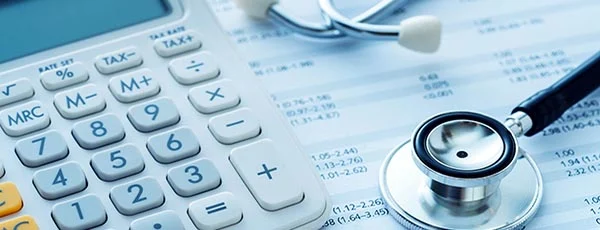- Medical debt in collections is stressful, but there are solutions.
- Payment plans, debt negotiation, and medical bill advocates may help.
- Medical collections do not affect your credit score once paid.
- Start your FREE debt assessment
Medical bills can take a severe toll on your budget, especially if you're uninsured or underinsured. And even if you do have insurance coverage, it may not pay for all the care you need.
Those bills may be sent to a collection agency if you fall behind on payments. Collections on medical bills can damage your credit score and they can open you up to creditor lawsuits. Knowing how to deal with unpaid medical bills can help you minimize any negative financial consequences.
Check Your Medical Bills
The first step in managing collections on medical bills is knowing what you owe and to which provider. Suppose you have surgery at your local hospital, for instance. In that case, you may get separate bills from the hospital, the surgeon, the anesthesiologist, and the lab or radiology department if you required pre-op blood tests or x-rays.
Organizing your bills can help you to formulate a plan for dealing with them. It can also help you to avoid being overcharged for medical care. The Consumer Financial Protection Bureau (CFPB) estimates that $88 million in medical bills are listed on consumer credit reports. Still, it asserts that not all of those bills may be accurate.
There are a few important things to look for when reviewing medical bills, including:
- Services or procedures you received
- Date services were provided
- Name of the provider
- Amount of each service
- Amount your insurance company paid or will pay
- How much you're expected to pay
Also, make sure that your personal information is correct. If you have a fairly common name, you might receive bills for charges that belong to someone else.
Some of the most common medical billing errors include double billing, billing for services never received, and inaccurate pricing. So it's essential to ensure each item listed is correct. Suppose you see something you think is incorrect. In that case, you can reach out to the provider listed on the statement for clarification.
You may also need to contact your insurance company to determine how much was paid and why you owe the amount listed on your billing statement. It's always possible that the insurance company made an error in paying covered costs, leaving you with a larger bill.
If you're dealing with a debt collection agency, you can send them a debt validation request. Under the Fair Debt Collection Practices Act, debt collectors are required to validate that a debt is accurate and belongs to you if you request it in writing.
And it's important to know your rights concerning medical billing. Under the No Surprises Act, you should not receive unexpected medical bills for emergency services from providers you didn't know were out of network. If you don't have health insurance, providers must give you a good faith estimate of charges before you receive care.
Find Financial Assistance to Pay Medical Bills in Collection
If you've verified that all of your medical bills in collections are accurate, the next step is figuring out how to pay for them. Financial assistance can help with collections on medical bills, and there are a few different possibilities for getting aid.
Before you pay your medical bills with a credit card, look for other solutions. First, you can talk to the providers to see if they offer financial assistance. That might include:
- Payment plans
- Steep discounts if you agree to pay the bill in cash
- Charity care
Charity care programs can reduce medical debt and even eliminate bills. Eligibility for charity care programs typically depends on your household income, assets, expenses, and how much debt you owe.
If you received care at a nonprofit hospital, they're required by law to offer financial assistance programs to patients. You can contact the hospital's billing department to ask what options are available and how to apply for aid.
Government programs may also be able to help collections on medical bills. Medicaid, for example, is a federal program administered by state agencies to provide low-cost or free health care for eligible individuals and families. Like charity care programs, Medicaid eligibility is based on your financial situation, including household size, income, and assets. You can contact your local social services office to ask about applying for Medicaid.
Medical Bills in Collection and Your Credit Score
Generally speaking, collection accounts can be detrimental to your credit scores. Payment history accounts for 35% of your score calculation with FICO scores. Late payments, missed payments, delinquencies, and collections can all work against you and cost you significant points.
As of July 1, 2022, paid medical collection accounts no longer be reported on consumer credit reports, thanks to changes implemented by the major credit bureaus Equifax, Experian, and TransUnion. Unpaid medical bills can still count for credit scoring. They have less impact than other types of unpaid bills, such as credit cards or loans. So, paying them off could work to your advantage if you have medical bills in collections.
Going forward, third-party medical collections will be added to credit reports only after 12 months have passed. The three major credit bureaus will no longer report third-party medical collection debt under at least $500 starting in early 2023. That may offer some credit score relief if you're struggling to keep up with medical debt.
Debt relief for medical bills in collections
Debt relief services can help you to pay off debts for less than what's owed. For example, suppose you owe $10,000 to the hospital. In that case, a debt relief agency may be able to negotiate that down to $6,000 instead. You'd make monthly payments to the debt relief company while negotiations are ongoing. Once the hospital agrees to settle the debt, the money you've been paying is handed over to the hospital, and the remaining balance is forgiven.
You could clear the debt for less, though you may pay a fee to the debt relief agency for its services. Is debt relief for medical bills in collections right for you? That depends on how much you owe, how far behind you are on bills and how much you can reasonably afford to pay a debt relief company each month. If you're interested in debt relief, it's important to research reputable organizations as there are numerous debt relief scams that are best avoided.
Free up cash each month with Freedom Debt Relief

Ozzy S., Freedom client
“Right away, I had more money each month because of program costs so much less than what I was paying on my minimums.”
Actual client of Freedom Debt Relief. Client’s endorsement is a paid testimonial. Individual results are not typical and will vary.
Do medical bills in collections ever go away?
Medical bills in collections can become uncollectable once the statute of limitations on debt has passed. That means you can no longer be sued for medical debt, but it does not erase the debt itself. The statute of limitations for medical debt varies from state to state.
Will medical debt be removed from your credit report?
Paid medical debt collection accounts can be removed from your credit reports. Unpaid medical collections can remain on your credit report for up to seven years, at which time the credit bureaus must, by law, remove them.
How do I remove medical bills from collections?
Paying outstanding medical bills is the best and most legitimate way to remove them from collections. You could pay in full or negotiate a settlement to pay less than what's owed. You could also send a letter of goodwill asking for the removal of the account without any promise to pay, though that may or may not be effective.
How to deal with a collection agency and medical debt?
If a third-party collection agency or debt collector contacts you the first step is to verify the debt. You can do this through a debt verification letter. If the debt belongs to you, check to see if the statute of limitations is valid. Don't let a debt collector harass you. Finally, seek debt relief options to deal with your medical bills. If your medical expenses are overwhelming and your financial hardship severe, then consider speaking with a bankruptcy lawyer.
Recommended Reads









